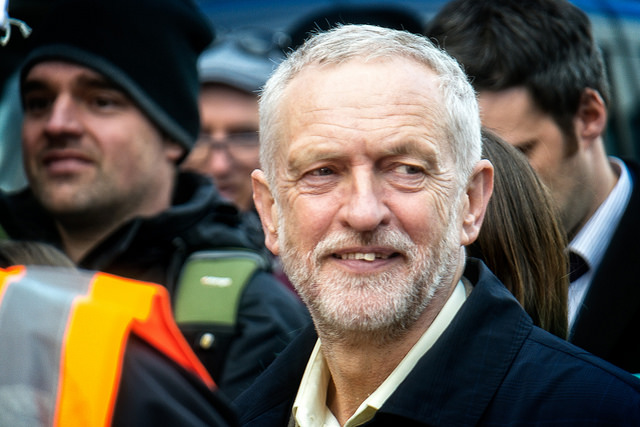Why Labour under Jeremy Corbyn is stuck on repeat after this poor election showing
The 2016 elections in England showed that Labour are not, according to Jeremy Corbyn’s critics, making the progress that they ought to be at this stage in the electoral cycle as an opposition party. Here, Alistair Clark explains why the Labour leader is stuck on repeat.
It seems a long time since anyone speculated about there being a Jeremy Corbyn bounce. Ahead of the local elections, the Labour leader sought to manage expectations by suggesting the party would not lose seats on English councils. The results were mixed. Jeremy Corbyn summed it up when he said the party had “clung on”.
And significantly, Labour fell even further in Scotland. It came in an unthinkable third place in the parliamentary election, behind the Conservatives. Its Welsh constituency position has also been eroded, down around 7.6% – although the party remains the largest in Cardiff Bay.
It lost councillors in England but fewer than had been projected by some. It held some important councils such as Nuneaton and Exeter (key swing councils) but with a projected national swing against it of around 4%, and in Nuneaton, a swing against the party of 11%. Even with a victory in the London mayoral election for Sadiq Kahn, this is hardly a party which looks like it is heading for government.
In a sign of how low expectations had been managed, Labour’s spokespeople have been out in force spinning this as a reasonable night for the party.
This is the end of a torrid period for Labour. The row about whether it has a problem with antisemitism has kept the party on the front pages for the wrong reasons. As polls closed, Andy Burnham, one of the 2015 leadership contenders, appeared to declare that he would be standing for the post of Manchester mayor in 2017. And UKIP seemed to continue to win over the “left behind” voters who would once have been Labour’s bedrock.
Estimates are that Labour needs a 13% swing in England to be in a position to win a majority in 2020. According to a recent YouGov survey, only 14% of voters think Labour can win a general election if Corbyn remains leader. Among Labour voters, the figure is only 27%. A third of voters think he should step down now, while 42% of Labour voters think he should lead the party into the general election.
Stalemate
The party looks stuck, unable to move forward even if it could agree in which direction to go in. It is caught between a leader who is unpopular among the party’s MPs and the broader electorate, but hugely popular with the large influx of members and supporters that joined the party in 2015 to back his leadership bid. The party is publicly divided on a number of issues – from Europe to Trident.
There are regular rumours about challenges to Corbyn’s leadership. Yet these results are not bad enough for anyone to move against him. Tom Watson, the deputy leader, made an early warning about this during election night when he said it was too early to remove Corbyn.
MPs, he argued, need to respect the mandate he was given just eight months ago. Historically, Labour has never been good at removing leaders. There were years of half-hearted attempts to remove Gordon Brown and plotting against Ed Miliband.
Corbyn is unlikely to stand down voluntarily and under Labour Party rules, challengers to sitting leaders need to be nominated by 20% of the parliamentary party. While this may appear theoretically possible given internal disquiet, immediate challengers seldom become leaders. A stalking horse would be required. It is far from obvious who that would be, nor what might now trigger such as move given the results overnight were so mixed.
Changes to the party rule book in 2014 mean that Labour leaders are now elected by registered supporters as well as fully paid-up members and a further category of affiliated supporters (who were trade union members that had opted in to support the party). Every member or supporter has one vote. This system was used in 2015 to elect Corbyn.
The many new members who elected Corbyn are highly unlikely to vote for anyone from the right of the party or who has had a part in unseating him. In truth, many Labour members have been looking for someone like Corbyn for a long time and the choices for those disgruntled with Corbyn are limited.
Meanwhile, this prisoners’ dilemma over the Labour leadership is becoming a bigger problem for Britain more generally. Many Labour members appear more interested in controlling the party than entering government. British politics requires a strong opposition to hold the government to account and to challenge for office. Labour seems absent without leave on too many issues since the 2015 general election defeat. Its leadership travails mean the party is failing to set a positive agenda.
The Conservative Party has had the luxury of being able to have its own very public divisions over the EU referendum, and a number of other policy mishaps, without Labour being able to take much benefit. A Labour opposition with sharper instincts should be making much more headway than has been seen in these elections.
—
This article was originally published on The Conversation. Read the original article. It represents the views of the author and not those of Democratic Audit or the LSE. Please read our comments policy before posting.
—
 Dr. Alistair Clark is Senior Lecturer in Politics at Newcastle University and currently a Trustee of the UK Political Studies Association. His research interests involve political parties, elections and electoral integrity. He has written extensively on Scottish constituency and local electoral politics and is currently completing a second edition of the book Political Parties in the UK.
Dr. Alistair Clark is Senior Lecturer in Politics at Newcastle University and currently a Trustee of the UK Political Studies Association. His research interests involve political parties, elections and electoral integrity. He has written extensively on Scottish constituency and local electoral politics and is currently completing a second edition of the book Political Parties in the UK.






 Democratic Audit's core funding is provided by the Joseph Rowntree Charitable Trust. Additional funding is provided by the London School of Economics.
Democratic Audit's core funding is provided by the Joseph Rowntree Charitable Trust. Additional funding is provided by the London School of Economics.
Why Labour under Jeremy Corbyn is stuck on repeat after this poor election showing https://t.co/PvQPprHEpE
Why Labour under Jeremy Corbyn is stuck on repeat after this poor election showing https://t.co/0OaXzFCqDv
Why Labour under Jeremy Corbyn is stuck on repeat after this poor election showing https://t.co/RE9vjA1s5J
Why Labour under Jeremy Corbyn is stuck on repeat after this poor election showing https://t.co/hdC4GxwjLf
Why Labour under Jeremy Corbyn is stuck on repeat after this poor election showing https://t.co/Y17D35EEgE https://t.co/KnSyWOZUd8
Why Labour under Jeremy Corbyn is stuck on repeat after this poor election showing https://t.co/RN0W444GEJ https://t.co/kHNqo5uVNs